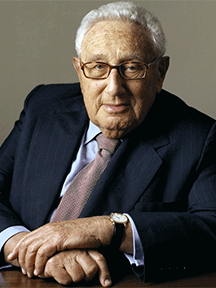By Sarah Vukalovic
Henry Kissinger, Harvard graduate and Phi Beta Kappa member since 1950, has influenced international policies in the U.S. for decades. He has a long and varied career in international politics and foreign affairs, including a position as the Secretary of State from 1973-1977. During this appointment he was awarded the Nobel Peace Prize for his hand in establishing a ceasefire during the Vietnam War. Kissinger also received the nation’s highest civilian award, the Presidential Medal of Freedom.
Born into a Jewish family in Germany in 1923, Kissinger and his family later fled Nazi persecution and arrived in the U.S. in 1938. A naturalized U.S. citizen in 1943, Kissinger served in the Army prior to pursuing his higher education, after which time he launched his controversial political career.
Most recently, Kissinger has spoken about the 2014 Ukraine Crisis, suggesting a series of actions to be taken by the U.S., NATO, and the Russian government to achieve a peaceful resolution of the current conflicts in Crimea. “The test of a policy is how it ends, not how it begins,” Kissinger maintained in an article for The Washington Post.
Kissinger argued against a partisan solution to the Ukrainian revolution, suggesting that the issue ought not be addressed as a conflict between the East and West. “…if the Ukraine is to survive and thrive, it must not be either side’s outpost against the other—it should function as a bridge between them,” he posited.
According to Kissinger, the Ukrainian people themselves, rather than the Russian government or the politics of the European Union, are the decisive factor that ought to determine the resolution of the conflict. Recognizing that Crimea is split linguistically, ethnically, and religiously, Kissinger maintained that,
“Any attempt by one wing of Ukraine to dominate the other–as has been the pattern–would lead eventually to civil war or break up. To treat Ukraine as part of an East-West confrontation would scuttle for decades any prospect to bring Russia and the West…into a cooperative international system.”
Kissinger suggests a fourfold solution. Firstly, Ukraine should freely choose its political associations. Ukraine should not join NATO; it should create a system of government stipulated by its people while maintaining policies of independence and avoiding hostility towards Russia. And Russia, in return, must recognize Ukraine’s rule over Crimea.
No stranger to controversy, Kissinger has generated conflicting feedback on his proposal. The Washington Times found his analysis “flawed and offensive,” accusing the former Secretary of State of a gross oversimplification of the issue as well as radical sympathy with the Russian position.
Kissinger himself, however, seemed to anticipate unavoidable criticism. “The test is not absolute satisfaction,” he wrote, “but balanced dissatisfaction.”
Sarah Vukalovic is a senior at the University of Dallas majoring in Philosophy. The University of Dallas is home to the Eta of Texas Chapter of Phi Beta Kappa.




